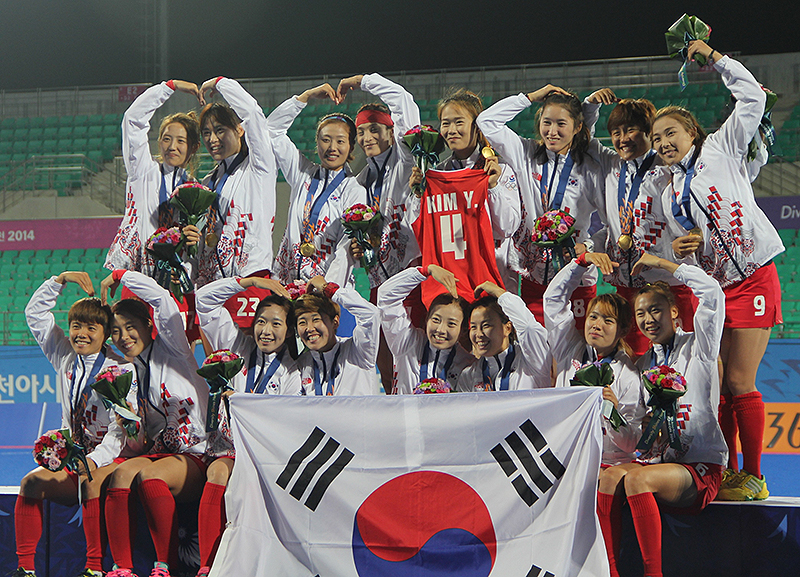Korea women take first Asian Games gold since 1998
On the final day of the women’s competition in Incheon, Korea took gold with a hard-fought win over China, while India defeated Japan for the bronze medal. In the match for fifth place, Malaysia thrashed Kazakhstan.
The highlight of the day was the big final between China and Korea, a battle not only for gold, but also a place in the Rio 2016 Olympic hockey tournament, the first place to be assigned to a team. It was a rematch of the final four years ago, at the last Asian Games in Guangzhou, China in 2010, and as it was the case then, the hosts took the glory.
Korea had the better start into the match, while China took some time to find their feet, but in a hectic game fiercely focused on defense, they could not translate their advantage into a goal. After the break, Korea started to increase the pressure and broke through more often and finally broke the spell in the 41st minute when a bouncy ball fell to Kim Darae in the circle. She did not hesitate and pushed the ball over the line for the goal which would eventually turn out to be the only one and the winning one.

China fought hard until the final whistle to level the scores but Korea countered well and in the end, left the field as the deserved winner of the match and this tournament as well as the holder of the first ticket to the Olympic hockey tournament in Rio. After the match, Chinese coach You Baodong commented that both teams had played a very good game, but the difference had been that Korea knew to convert their opportunities while China had failed to do so. Korean coach Han Jin Soo, asked when he will start preparing for the Rio 2016 Olympic Games that the team has now qualified for, smilingly replied: “Today. Now.”
Earlier, Japan and India had taken to the field to dispute the bronze medal. The first half of the match was even, India was slightly stronger but not by much, yet enough to claim the halftime lead through a penalty corner converted by Jaspreet Kaur. In the second half, scoring opportunities remained scarce, until Akane Shibata found herself in the right place in a crowded circle and pushed the ball over the line for the long sought equalizer. Japan’s joy was shortlived however as India replied within less than a minute, with Rani setting up Vandana Katariya in front of an empty goal.
For the remainder of the match, Japan pushed to level the scores, but India withstood the pressure well, both physically and mentally, and even had another great opportunity with a shot going just wide. As the final whistle sounded, confirming India’s bronze medal, the Indian players celebrated, the elation and relief clearly visible on their faces. Coach Neil Hawgood also got emotional, describing today’s win as “the result of 2,5 years of very hard work”, and confessing special pride in the resilience shown by the still extremely young group of players in the face of a tough and talented Japanese team.
In the match for fifth place between Malaysia and Kazakhstan, the first two quarters were open battle, and neither team could create a significant advantage. Malaysia scored in the 20th minute, but it was still close, until the game tipped after the break. Malaysia had the advantage in numbers for five minutes when Natalya Gataulina was yellowcarded, and two goals within a minute took Malaysia to a solid three-goal lead. In the final quarter of the game, the team from Kazakhstan seemed exhausted and started to fade, which the still energetic Malaysian girls used to pile four goals on for an 8-0 final score. Malaysia thus finished in fifth place, the same position the team achieved at the last Asian Games four years ago.
Results
Wednesday, 1 October 2014 – Women
5/6th place: Malaysia – Kazakhstan 8-0 (1-0)
Bronze Medal: Japan – India 1-2 (0-1)
Final: China – Korea 0-1 (0-0)
To keep up with the hockey in Incheon, join us at www.asiahockey.org, on Facebook at www.facebook.com/asiahockey and on Twitter at twitter.com/asia_hockey. To find out more about all the action at the Asian Games Incheon 2014, please visit the official event website www.incheon2014ag.org/index.





